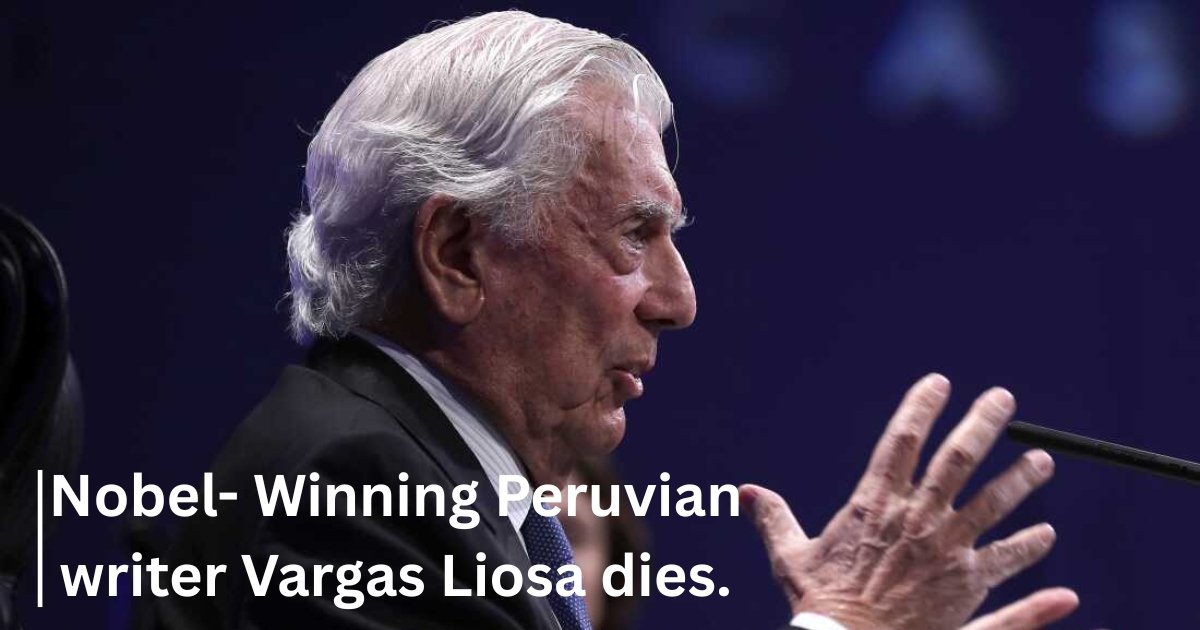
Marlo vargas Llosa the peruvian novelist who combined grinity realism with playful erotca and depictions of the struggle for individual liberty in Latin America while alsowritting essays that made him one of the most influential political commentators in the spanish-speaking world, died on sundays in Lima, he was 89.
His death was announced in the social media statement from his children, Alvaro Gonzalo and Morgana Vargas Llso.
Vargas Llosa who won Noble Prize in Literature in 2010, gained renown as a young writer with slangy, blistering visions of the corruptions, moral compromises and cruelty festering in Peru. he joined a cohort of writers like Gabriel Garcia Marquez of Colombia and Julio Cortazar of argentina who became famous in the 1980s as members of Latina America’s Literary “boom generation”.
His distaste for the norms of politie society in Peru gave him abundant inspiration. After he was enrolled at the age of 14 in the Lencio Prado Miliitary Academy in Lima Vargas Llsoa turned that experience into his first novel. The time of the hero, a critical account of millitary life published in 1963.
The book was denounced by several generals, including on who claimed it was financed by Ecuador to undermine Peru’s military all of which helped make it an immediate success.
Vargas Llso was never fully enamoured however by his contemporaries magical realism, and he was delusional with Fidel Castro’s persecution of dissidents in Cuba, breaking from the leftist ideology that held away for decades over many writers in Latina America.
He charted his own path as a conservative, often divisive political thinker as a novelist who transformed episodes from his personal life into books that reverberated far beyond the borders of his native country.
His dabbling in politics ultimately led to a run for the presidency in 1990. That race allowed him to champion the free market causes he espoused including the pravatisation of state enterprises and reducing inflation through government spending cuts and layoffs of the bloated civil service. He led polls for much of the race but was roundly defeated by Alberto Fujimori then a little known agronomist of Japanese descent who later adopted many of Vargas Llso’s politics.
Vargas Lloso had a passion for fiction, but he started out in journalism. As a teenager he was night reporter for Lacronica, a lime daily chronocolly an underworld of dive bars,crime and prostitute. Elements of that experience fed into his 1969 novel”conversation to the cathedral” a depiction of peru’s malaise under Gen.
The column could be either autobiographical or inspired by news events and were often bereft of adjectives and elegantly written in a style allowed Llosa to reach out to the readers who might not have had the patience to finish some of his longer completely crafted novels.
Tributes have poured in from around the world. Leaders such as French President Emmanuel Macron, Spanish Prime Minister Pedro Sánchez, and Peruvian President Dina Boluarte have honored his legacy. The Peruvian government declared April 14 a national day of mourning, with flags flown at half-mast. In Spain, the city of Marbella, where Vargas Llosa often resided, observed two days of official mourning.Vargas Llosa’s passing marks the end of an era in Latin American literature. His profound impact on storytelling and political discourse will continue to inspire generations to come.
As the literary world says goodbye to one of its greatest voices, Mario Vargas Llosa leaves behind a legacy that stretches far beyond his novels. He was a storyteller, a provocateur, a thinker, and a visionary. His pen captured the turbulence of Latin America and the inner revolts of humankind. With his passing, an era comes to a close, but his voice, sharp and enduring, will continue to echo through the pages of literature for generations to come.
